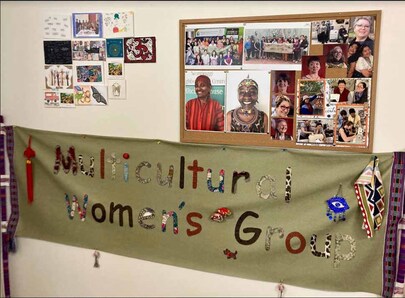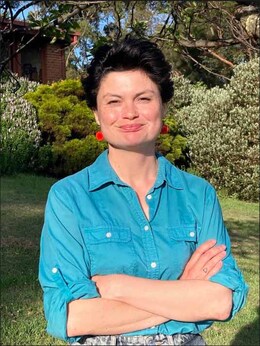 Wonthaggi Neighbourhood House hosts a women’s multicultural group,
Wonthaggi Neighbourhood House hosts a women’s multicultural group, one of many activities to welcome refugees to Bass Coast.
By Gemma Sou
HOW does the Bass Coast community welcome people from refugee backgrounds? That’s the question I’m currently investigating as part of my Vice Chancellor Fellowship based at the RMIT University.
Why this topic? Across Australia, people from refugee backgrounds are increasingly moving to small regional towns, rather than bigger cities such as Melbourne or Sydney. Many people in Australia assume that regional towns are dominated by xenophobic and discriminatory attitudes to people from refugee backgrounds. However, this is only one part of the story.
HOW does the Bass Coast community welcome people from refugee backgrounds? That’s the question I’m currently investigating as part of my Vice Chancellor Fellowship based at the RMIT University.
Why this topic? Across Australia, people from refugee backgrounds are increasingly moving to small regional towns, rather than bigger cities such as Melbourne or Sydney. Many people in Australia assume that regional towns are dominated by xenophobic and discriminatory attitudes to people from refugee backgrounds. However, this is only one part of the story.
I’m keen to know more about the role local community members play in supporting the settlement of people from refugee backgrounds, and how this support is experienced by people from refugee backgrounds.
Why Bass Coast? When choosing a location for this project, my research revealed that Bass Coast is steadily seeing people from refugee backgrounds come to live in the area temporarily and permanently. The more we know about the local welcome culture, the better we can understand the liveability of Bass Coast for people of refugee backgrounds. We can also have an evidence base to inform interventions to improve the experiences of people from refugee backgrounds who call Bass Coast home – temporarily or permanently.
Why Bass Coast? When choosing a location for this project, my research revealed that Bass Coast is steadily seeing people from refugee backgrounds come to live in the area temporarily and permanently. The more we know about the local welcome culture, the better we can understand the liveability of Bass Coast for people of refugee backgrounds. We can also have an evidence base to inform interventions to improve the experiences of people from refugee backgrounds who call Bass Coast home – temporarily or permanently.
 Dr Gemma Sou wants to develop a comic based on the experience of refugees in Bass Coast.
Dr Gemma Sou wants to develop a comic based on the experience of refugees in Bass Coast. I only arrived five weeks ago, and the welcome culture is already very apparent. I’ve discovered a wide array of community-based activities in the area. These vary from the Coastal Connections – Work Ties initiative at Bass Coast Adult Learning Centre; a women’s multicultural group that works through the Wonthaggi Neighbourhood House; fund-raising for refugee families; refugee sponsorship groups; English classes; social events such as coffee mornings; Harmony Day; and community members helping people of refugee backgrounds to secure employment and housing. People from refugee backgrounds also tell me that even a friendly “hello” or “good morning” is part of the “welcome culture” in the Bass Coast.
As a researcher, it’s very important that my research has a positive impact and is useful for communities. I’ve previously produced an award-winning comic called After Maria, based on my research into how Puerto Rican families recovered from Hurricane Maria in 2017. There is a huge (international) appetite to use these resources in the classroom.
I’m keen to develop a comic that can be used by teachers in Bass Coast (and beyond) to educate students aged 11-plus about the people from refugee backgrounds living in regional towns; about the power of welcome culture; and the character of multiculturalism and solidarity in the Bass Coast. The comic also aims to advocate for and raise awareness of welcome culture in regional parts of Australia more broadly. I’ll write the comic script and it will be illustrated by a local female artist.
I would also like to develop a community-led photo exhibition to advocate for Bass Coast and a report to inform organisations working on Bass Coast development.
Please get in touch if you would like to know more or to take part in the research. I am also seeking a financial grant to support this project. If you would like to support and partner on this project, I would love to hear from you.
Contact Dr. Gemma Sou, email [email protected], Website: www.gemmasou.com
As a researcher, it’s very important that my research has a positive impact and is useful for communities. I’ve previously produced an award-winning comic called After Maria, based on my research into how Puerto Rican families recovered from Hurricane Maria in 2017. There is a huge (international) appetite to use these resources in the classroom.
I’m keen to develop a comic that can be used by teachers in Bass Coast (and beyond) to educate students aged 11-plus about the people from refugee backgrounds living in regional towns; about the power of welcome culture; and the character of multiculturalism and solidarity in the Bass Coast. The comic also aims to advocate for and raise awareness of welcome culture in regional parts of Australia more broadly. I’ll write the comic script and it will be illustrated by a local female artist.
I would also like to develop a community-led photo exhibition to advocate for Bass Coast and a report to inform organisations working on Bass Coast development.
Please get in touch if you would like to know more or to take part in the research. I am also seeking a financial grant to support this project. If you would like to support and partner on this project, I would love to hear from you.
Contact Dr. Gemma Sou, email [email protected], Website: www.gemmasou.com